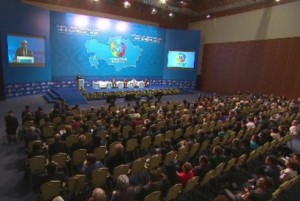 ASTANA – Kazakhstan’s sixth Civil Forum, held in Astana on Nov. 14 and 15, resulted in a number of recommendations for national and local government bodies, as well as for the country’s non-governmental organisations. The forum brought together major nongovernmental organisation leaders from around the country, as well as government and international organisation representatives to discuss fostering cooperation between the government and civil society.
ASTANA – Kazakhstan’s sixth Civil Forum, held in Astana on Nov. 14 and 15, resulted in a number of recommendations for national and local government bodies, as well as for the country’s non-governmental organisations. The forum brought together major nongovernmental organisation leaders from around the country, as well as government and international organisation representatives to discuss fostering cooperation between the government and civil society.
The Ministries of Culture and Information, Finance, Economy and Budget Planning, Regional Development, and Justice were called uponto, among other activities, complete the draft law on state support for NGOs, amend Kazakhstan’s laws governing patronage of the arts, resolve public procurement issues, create a new mechanism for grant provision and create incentives for business to become more involved in civil society.
The forum also called for transparency from international organisations and donor agencies and requested the Ministry of Foreign Affairs create a coordination council to discuss issues, including determining the needs of social development of Kazakhstan. It also recommended acceding to the European Charter on Local Self-Governance.
Regional government bodies were instructed to involve populations they serve in determining priorities for assistance and to conduct research into and hold public meetings on prioritising social projects.
NGOs were asked to create a new action plan for self-governance in Kazakhstan, publish annual reports of their work and create working groups to address specific issues, among other tasks.
It was also recommended that a database of past and current NGO projects, an online collection of Kazakhstan’s inventions for EXPO 2017 and a register of current available green technologies be created, as well as an international corps of volunteers within Kazakhstan based on the U.S. Peace Corps. The complete list of recommendations will be presented to the relevant bodies.
The forum began with a review of some of the accomplishments of Kazakhstan’s NGO sector since the first forum a decade ago, including the creation of the Civil Alliance of Kazakhstan, the growing number of NGOs, their growing visibility and increasing government support for them. More than US$39 million has been allocated for implementing joint government-NGO projects and developing the NGO sector this year.
“Interaction with NGOs is a mandatory criteria for government bodies and influences their ranking,” noted First Deputy Prime Minister of Kazakhstan Bakytzhanan Sagyntayev during the opening of the forum. He also noted that “a professionally developed, responsible nongovermental sector is a big competitive advantage for Kazakhstan.” President Nursultan Nazarbayev has made the development of civil society a priority of his Kazakhstan 2050 strategy, which seeks to make Kazakhstan one of the world’s 30 most developed nations by 2050.
A number of remaining challenges to the development of the NGO sector were also identified on the first day, including the need for long-term funding for programmes and the need for more programmes in the Kazakh language and more methodological and training literature in Kazakh.
There was also a call for a comprehensive review of the sector to study successful organisations and close down ineffective ones. Head of the Civil Alliance of Kazakhstan Nurlan Yerimbetov said that the alliance should outline how they will work with people and that they “must raise the level of the conversation.”
On Nov. 15, six panel discussions were held covering legislative support of the interaction between the state and NGOs, verification and development of principles and mechanisms of NGO accountability to the public, NGO participation in regional development and local self-governance, developing patronage, a culture of charity and social responsibility, interacting with international and foreign NGOs, and NGOs and pan-national projects: the green economy, EXPO 2017 and the State Programme of Accelerated Industrial and Innovative Development.
Former head of the Civil Alliance of Kazakhstan Alina Khamatdinova and Sergei Gulyayev, director of the Decenta Foundation, a resource centre for NGOs, moderated the panel on accountability, during which the nature of accountability to donors, other stakeholders and recipients of services was discussed.
“Nowadays, NGOs most of the time are accountable to donors only, and that has to be changed,” said Gulyayev. Publication, self regulation, social auditing, the participation of beneficiaries in NGO activities and public monitoring and evaluations were six components of accountability put forth at the panel.
Promoting trust was also a major concern, with Gulyayev commenting that there is a current lack of faith in civil society and the rule of law, and that NGOs need to provide positive examples to the population.
